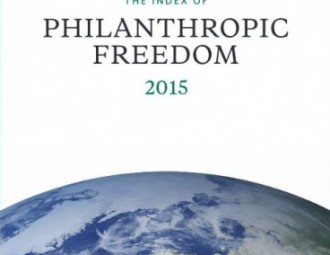Belarus appeared on the Interactive Map of Philanthropic Freedom for the first time

The Center for Global Prosperity and the Hudson Institute published the Index of Philanthropic Freedom 2015, where Belarus is now on the map, too.
The Center for Global Prosperity and the Hudson Institute published the Index of Philanthropic Freedom.
Covering 64 countries around the world, the Index is a comprehensive study of what drives global giving.
For the first time, information on the situation in Belarus was included into the document. The section was prepared by the Assembly of NGOs lawyer, Yury Chavusau. The assessment of the ease of giving in Belarus are not very positive. As the study says, “home to the lowest scores in the region, Belarus’s philanthropic environment is one of the study’s least hospitable. Registration, which is mandatory, is exceptionally difficult and is plagued by a number of deficiencies”.
The Index of Philanthropic Freedom 2015 is the first analysis of philanthropic freedom across the world. By examining barriers and incentives for individuals and organizations to donate money and time to social causes, CGP has measured, ranked, and compared 64 countries around the globe on their ease of giving. The research is a major step in identifying the public policy actions to encourage private giving which, in turn, can increase generosity.
The Index ranks and compares countries on their enabling environment for philanthropy by assessing (1) the ease of registering, operating, and dissolving civil society organizations, (2) the availability and attainability of tax deductions and exemptions, and (3) the ease of engaging in cross-border philanthropy.
You can find more information about Belarus’ philanthropic freedom assessments as well as read the whole analysis in English here.
-
03.01
-
07.10
-
22.09
-
17.08
-
12.08
-
30.09



























